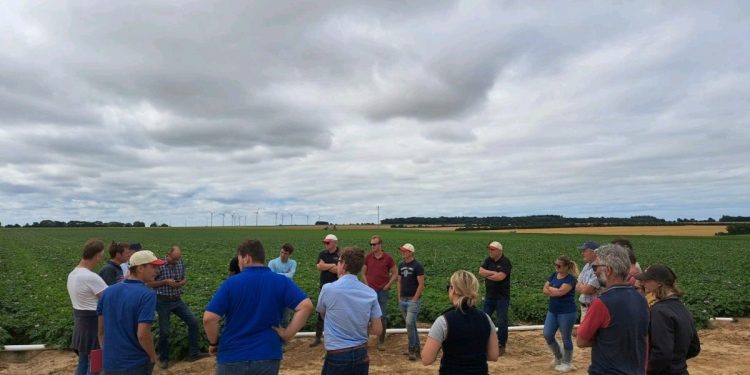On Tuesday, July 11th, HZPC France organized a technical visit to our microirrigation trial located in a plot of Franceline potato plants in Côte d’Opale (62), France. The event brought together enthusiastic potato producers, the Chamber of Agriculture Nord-Pas-de-Calais, NETAFIM FRANCE, and our Production team for fruitful discussions and knowledge exchange. In this article, we will delve into the insights gained during the visit and explore the potential benefits of microirrigation techniques for potato cultivation.
Understanding Microirrigation and Its Advantages
Microirrigation is a modern irrigation method that delivers water and nutrients directly to the plant roots in precise amounts, significantly reducing water wastage and optimizing plant growth. During the field visit, participants were introduced to different microirrigation systems and witnessed firsthand the impact of this innovative technique on the Franceline potato crops.
Microirrigation provides several advantages, such as improved water efficiency, reduced water runoff, and better control over nutrient delivery. With water becoming an increasingly scarce resource, adopting microirrigation can play a crucial role in sustainable agriculture practices and ensure a more efficient use of water resources.
Enhancing Potato Yield and Quality
One of the key aspects discussed during the visit was the potential increase in potato yield and quality achieved through microirrigation. Precisely delivering water and nutrients to the roots allows for better nutrient uptake by the plants, leading to healthier and more productive crops. Additionally, the controlled application of water helps prevent water stress and promotes uniform tuber development, resulting in higher-quality potatoes.
Microirrigation has shown promising results in improving marketable yields and reducing crop losses, making it an attractive option for potato farmers looking to enhance their production output and profitability.
Efficiency and Cost-Effectiveness
Another significant benefit highlighted during the field visit was the cost-effectiveness of microirrigation systems. While the initial setup and installation costs may be higher than traditional irrigation methods, the long-term savings in water usage and increased crop yield more than offset the initial investment.
Furthermore, the reduced need for manual labor in irrigation management and the ability to use water and fertilizers more efficiently contribute to overall cost savings. Participants were impressed by the potential return on investment offered by microirrigation, making it a viable option for both small-scale and large-scale potato producers.
Collaboration and Knowledge Exchange
The field visit provided a unique platform for collaboration and knowledge exchange among potato producers, agricultural experts, and irrigation technology providers. Participants were encouraged to share their experiences, challenges, and best practices related to potato cultivation and irrigation.
The presence of representatives from the Chamber of Agriculture Nord-Pas-de-Calais and NETAFIM FRANCE added valuable insights and expertise to the discussions. Such collaborations foster innovation and the adoption of modern agricultural techniques, benefiting the entire potato farming community.
Conclusion and Future Actions
The field visit to the microirrigation trial in Côte d’Opale showcased the potential of this advanced irrigation technique in potato cultivation. The benefits of water efficiency, increased yield, and improved crop quality are appealing to potato farmers seeking sustainable and profitable agricultural practices.
As the agricultural community continues to explore innovative solutions, microirrigation stands out as a promising option for optimizing potato production. Implementing microirrigation systems may require further research and investment, but the long-term benefits for both the environment and potato producers are well worth the effort.
Future actions include continued collaboration between potato producers, agricultural institutions, and irrigation technology providers to further refine and promote microirrigation techniques. By sharing knowledge and experiences, the industry can collectively move towards a more sustainable and efficient future for potato cultivation.
#potato #microirrigation #sustainableagriculture #waterefficiency #cropquality #innovation #agriculturaltour #farmingcommunity #irrigationtechnology #knowledgeexchange.







